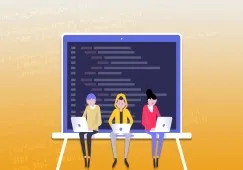
Complete DevOps Gitlab & Kubernetes: Best Practices Bootcamp 
This online tutorial provides a comprehensive overview of DevOps integration with Gitlab and Kubernetes. Sign up now to gain the skills and knowledge needed to master DevOps best practices of Bootcamp. ▼
ADVERTISEMENT
Course Feature
![]() Cost:
Cost:
Paid
![]() Provider:
Provider:
Eduonix
![]() Certificate:
Certificate:
No Information
![]() Language:
Language:
English
![]() Start Date:
Start Date:
Self Paced
Course Overview
❗The content presented here is sourced directly from Eduonix platform. For comprehensive course details, including enrollment information, simply click on the 'Go to class' link on our website.
Updated in [March 06th, 2023]
This course provides learners with a comprehensive overview of DevOps and its best practices. Learners will gain an understanding of the fundamentals of DevOps, including its history, principles, and tools. They will also learn how to integrate Gitlab and Kubernetes into their DevOps workflow. Additionally, learners will be able to apply the best practices of DevOps Bootcamp to their own projects.
Learners will gain a deep understanding of the DevOps process, from planning and development to deployment and monitoring. They will learn how to use Gitlab and Kubernetes to automate their DevOps workflow and ensure that their projects are running smoothly. Additionally, learners will be able to apply the best practices of DevOps Bootcamp to their own projects.
Finally, learners will be able to use the knowledge gained in this course to develop their own DevOps projects. They will be able to use the best practices of DevOps Bootcamp to create projects that are efficient, reliable, and secure. Additionally, learners will be able to use the tools and techniques learned in this course to troubleshoot and optimize their projects.
[Applications]
After completing this course, students can apply the knowledge they have gained to develop and deploy applications using Gitlab and Kubernetes. They can also use the best practices learned in the course to optimize their DevOps processes. Additionally, students can use the skills they have acquired to troubleshoot and debug any issues that may arise during the development and deployment of applications.
[Career Paths]
1. DevOps Engineer: DevOps Engineers are responsible for the design, implementation, and maintenance of the DevOps environment. They are responsible for ensuring that the development, testing, and production environments are properly configured and maintained. They also work closely with developers and operations teams to ensure that the DevOps environment is optimized for maximum efficiency. As DevOps continues to grow in popularity, the demand for DevOps Engineers is expected to increase.
2. Cloud Engineer: Cloud Engineers are responsible for the design, implementation, and maintenance of cloud-based systems. They are responsible for ensuring that the cloud-based systems are properly configured and maintained. They also work closely with developers and operations teams to ensure that the cloud-based systems are optimized for maximum efficiency. As cloud computing continues to grow in popularity, the demand for Cloud Engineers is expected to increase.
3. System Administrator: System Administrators are responsible for the design, implementation, and maintenance of computer systems. They are responsible for ensuring that the computer systems are properly configured and maintained. They also work closely with developers and operations teams to ensure that the computer systems are optimized for maximum efficiency. As technology continues to evolve, the demand for System Administrators is expected to increase.
4. Security Engineer: Security Engineers are responsible for the design, implementation, and maintenance of security systems. They are responsible for ensuring that the security systems are properly configured and maintained. They also work closely with developers and operations teams to ensure that the security systems are optimized for maximum efficiency. As cyber security continues to become more important, the demand for Security Engineers is expected to increase.
[Education Paths]
1. Bachelor of Science in Computer Science: This degree program provides students with a comprehensive understanding of computer science fundamentals, including programming, software engineering, and computer architecture. It also covers topics such as artificial intelligence, machine learning, and data science. With the increasing demand for software engineers and developers, this degree path is becoming increasingly popular.
2. Bachelor of Science in Information Technology: This degree program focuses on the development and management of information systems and networks. It covers topics such as database design, network security, and web development. With the growing demand for IT professionals, this degree path is becoming increasingly popular.
3. Master of Science in DevOps: This degree program focuses on the development and management of DevOps systems and processes. It covers topics such as automation, continuous integration, and containerization. With the increasing demand for DevOps professionals, this degree path is becoming increasingly popular.
4. Master of Science in Cloud Computing: This degree program focuses on the development and management of cloud computing systems and services. It covers topics such as cloud architecture, cloud security, and cloud storage. With the growing demand for cloud computing professionals, this degree path is becoming increasingly popular.
Pros & Cons

Comprehensive overview

Very good course

Limited detail

Unclear instructions

Q and DF not explained
Course Provider

Provider Eduonix's Stats at AZClass
Discussion and Reviews
0.0 (Based on 0 reviews)
Explore Similar Online Courses

A Complete Reinforcement Learning System (Capstone)

Abnormal Psychology

Python for Informatics: Exploring Information

Social Network Analysis

Introduction to Systematic Review and Meta-Analysis

The Analytics Edge

DCO042 - Python For Informatics

Causal Diagrams: Draw Your Assumptions Before Your Conclusions

Whole genome sequencing of bacterial genomes - tools and applications

DevOps Fundamentals With Agile Gain Solid Understanding

The DevOps Toolkit: Kubernetes Chaos Engineering
![Microsoft Azure DevOps Certification Training Course [AZ 400]](/ccsimg/dcs/img_tools/dcs_img_1691609508_f1144c26447da078f1e6f48f537907b0.webp)
Microsoft Azure DevOps Certification Training Course [AZ 400]
 Related Categories
Related Categories
 Popular Providers
Popular Providers
Quiz
 Submitted Sucessfully
Submitted Sucessfully
1. What is the main focus of this course?
2. What type of tutorial is this course?
3. What is the best way to learn DevOps best practices?
4. What is the main purpose of this course?
Correct Answer: To learn complete DevOps integration with Gitlab and Kubernetes.


Start your review of Complete DevOps Gitlab & Kubernetes: Best Practices Bootcamp